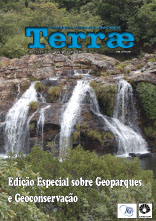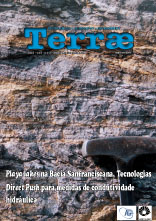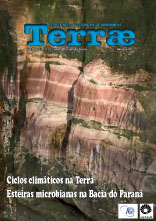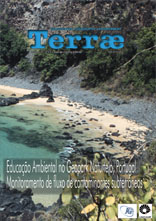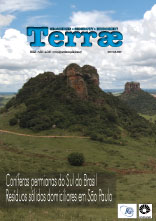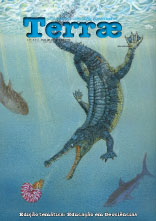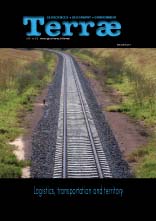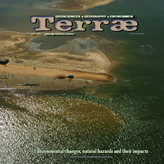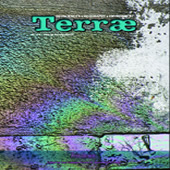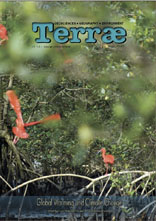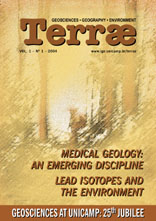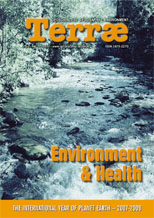Save the date / Call for papers
A revista Terræ publica simultaneamente as edições online de 2016 e 2017. As edições impressas acham-se temporariamente suspensas, pois os editores reconhecem que a internet oferece formas mais eficazes para disseminar rapidamente os resultados das pesquisas. As reformulações do periódico objetivam ampliar a abrangência, combinando redução de custos com rapidez de publicação. Cada vez mais a revista consolida a tendência de cobrir temas multidisciplinares que revelem formas de interação das Geociências com as diferentes áreas do conhecimento humano. A edição de Terræ 2017 é inteiramente dedicada ao tema GEOPARQUES.
A revista aceita trabalhos e comunicações em Português, Inglês e Espanhol.
Chamada de trabalhos / CALL FOR PAPERS
Uma vez recuperado o tempo de ausência na web, a edição de Terræ 2018 tornar-se-á uma boa opção para publicação de artigos científicos. O volume deverá reunir contribuições referentes a GEOÉTICA, tema que permite acomodar abordagens diferenciadas que revelem as inter-relações entre a sociedade e os ecossistemas terrestres.
O sistema de submissão e avaliação de artigos científicos está em pleno funcionamento, sendo feito exclusivamente pelo E-mail: terrae@ige.unicamp.br. Nosso sítio web está à sua disposição.
Esperamos sua visita e participação!
Os editores.
10/01/2018- 16:31 pm
Chamada de trabalhos/ Call for papers para o Volume 15, 2018
Novas contribuições são aceitas para o volume 2018 de Terræ.
Data limite 30.abril.2018
10/01/2018- 16:31 pm
Chamada de trabalhos/ Call for papers para os eventos:
VIII GeoSciEd 2018 – the 8th Quadrennial Conference of the
International Geoscience Education Organisation (IGEO)
– Geosciences for Everyone –
VIII Simpósio Nacional de Ensino e História de
Ciências da Terra / EnsinoGEO-2018
– Geociências para Todos –
Campinas – Sao Paulo – Brazil, July 2018
Acesse o site: http://www.ige.unicamp.br/geoscied2018/en/.
Data limite 11.fevereiro.2018
11/01/2018- 13:40 pm
Livro "Geologia do Brasil”, 2012: Reserve já seu exemplar, sem despesas de remessa.
Visite o endereço eletrônico: www.editorabeca.com.br
Os editores
Campinas, janeiro de 2018.
The use of lead isotope composition as a tool to investigate the anthropogenic impacts on the environment in the metropolitan region of Belém (Pará State, Brazil)
Cândido A. V. Moura
Laboratory of Isotopical Geology - Geosciences Center - Federal University of Pará - UFPA
Henri E. Gaudette
Department of Earth Sciences - University of New Hampshire - USA
Maria C. Carvalho
Post-graduate Program of Geology and Geochemistry - Federal University of Pará - UFPA
Gundisalvo P. Morales
Laboratory of Hydrocarbons - Center of Natural Sciences and Technology - Pará State University
ABSTRACT
The lead isotope composition of sediment and soil samples was used to investigate the anthropogenic impacts on the environment in the metropolitan region of Belém (MRB), state of Pará, Brazil. The sampling program was conducted in three different areas, including a sediment core in the city water reservoir, with indications of anthropogenic contribution of heavy metals to the environment. The 206Pb/207Pb ratio of the samples ranged between 1.20 to values lower than 1.16. The highest ratio values were related to bedrock erosion while the lowest values were associated with human induced lead in the environment due to industrial activities and/or urban occupation. As the geogenic and anthropogenic lead isotope composition of the studied sediments and soils samples are quite different, the lead isotopic ratios can be used to investigate anthropogenic impacts on the environment in the MRB. As the changes in the isotopic ratios were more evident than changes in the lead concentration, it is suggested that the use of the lead isotope composition may be more effective for monitoring the anthropogenic heavy metal inputs to the environment
A PDF reader is required to view the article files. Make the download here: Adobe Acrobat or Foxi



